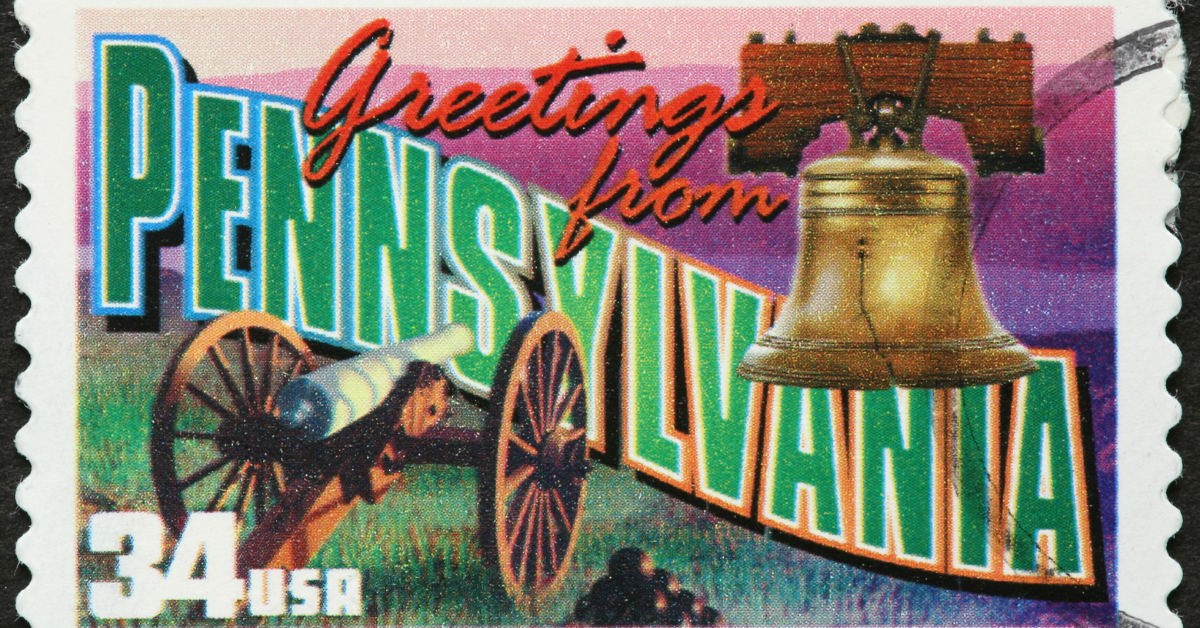Pennsylvania is a U.S. state known for its founding history and prestigious universities, but it does not have a specific kanji notation in Japanese. For Japanese people, the state is strongly associated with history, culture, and sports, shaping a unique perception.
Why Pennsylvania Does Not Have a Kanji Notation
Pennsylvania is an English-language name and does not originate from kanji-based cultures. Therefore, in Japanese, following the principle of writing foreign words, it is expressed in katakana as “ペンシルベニア州.”
On the other hand, in Chinese, it is sometimes written as “賓夕法尼亜州,” using characters to approximate the sound. This reflects the cultural difference in translation. In Japanese, such phonetic substitutions are rarely used, so katakana remains the standard form.
The Historical Image Japanese People Have of Pennsylvania
Pennsylvania is deeply tied to U.S. independence. Philadelphia, rather than the state capital Harrisburg, is especially symbolic for Japanese people as the “birthplace of American independence.”
- Independence Hall The site where the U.S. Declaration of Independence was signed
- Liberty Bell A symbol of independence and freedom
- Constitutional Convention Where the nation’s framework was established
Because of this background, Japanese people strongly associate Pennsylvania with the founding history of the United States.
Reputation as a Hub of Education and Scholarship
Pennsylvania is home to world-renowned educational institutions. Above all, the University of Pennsylvania, part of the Ivy League, is highly regarded in both research and education.
Here is an overview of leading universities:
| University | Key Features | Reputation in Japan |
|---|---|---|
| University of Pennsylvania | Ivy League, strong in business and medicine | Highly popular study-abroad destination |
| Carnegie Mellon University | Known for engineering, IT, robotics | Valued among technology researchers |
| University of Pittsburgh | Famous for medical research and hospital management | Strong ties in medical collaboration |
The high level of education and research is a key reason why Japanese people view Pennsylvania as an “intellectual state.”
Culture and Nature in Pennsylvania
The state is rich in cultural diversity. The Amish community is particularly distinctive, living with traditions that stand apart from modern society.
- Travel by horse-drawn carriage
- Living without electricity
- Handmade crafts and agricultural products
In addition, northern Pennsylvania offers vast forests and lakes, making it a hub for outdoor activities.
| Tourism Type | Features | Appeal to Japanese Visitors |
|---|---|---|
| Historical Tourism | Independence Hall in Philadelphia | Experience the founding history of the U.S. |
| Cultural Tourism | Amish villages | Unique cultural immersion |
| Nature Tourism | Hiking in forests and lakes | Enjoy American wilderness |
Variations in Katakana Notation
Pennsylvania’s name is written in two katakana forms in Japan: “ペンシルベニア” (Penshirubenia) and “ペンシルバニア” (Penshirubania).
| English | Japanese Notation | Common Usage |
|---|---|---|
| Pennsylvania | ペンシルベニア州 | Textbooks, maps, academic documents |
| Pennsylvania | ペンシルバニア州 | News articles, travel brochures, daily usage |
Both are correct and coexist, though “ペンシルベニア州” is more common in official contexts.
Pennsylvania’s Image Through Sports
Sports are another factor shaping Pennsylvania’s image. The state is home to many professional teams, familiar even to Japanese fans.
| Sport | Team | Characteristics |
|---|---|---|
| Baseball | Philadelphia Phillies | Historic MLB franchise |
| American Football | Pittsburgh Steelers | Multiple Super Bowl victories |
| Ice Hockey | Philadelphia Flyers / Pittsburgh Penguins | Fierce in-state rivalry |
| Basketball | Philadelphia 76ers | One of the NBA’s most historic teams |
In particular, the Philadelphia 76ers and Pittsburgh Steelers are highly recognizable, making sports a major contributor to how Japanese people connect with Pennsylvania.
Economic and Industrial Diversity
Pennsylvania has a broad economic base, including manufacturing, finance, agriculture, and energy. Its steel industry is historically famous, with Pittsburgh once called the “Steel City.”
Today, medical and IT industries are rapidly expanding, positioning Pennsylvania as a state where traditional industry and advanced technology coexist.
| Industry | Features | Image in Japan |
|---|---|---|
| Steel | Pittsburgh as the historic center | Symbol of an industrial city |
| Agriculture | Dairy, corn, fruits | Linked to Amish farming traditions |
| Medical | University of Pittsburgh Medical Center | Known as a hub of medical advancement |
| IT | Driven by Carnegie Mellon University | Associated with innovation and research |
Conclusion
Pennsylvania does not have a kanji notation and is written in katakana. Japanese people’s image of the state is shaped by Philadelphia’s history, Ivy League universities, Amish traditions, abundant nature, passionate sports culture, and a diverse economy.
Although less well-known than New York or California, Pennsylvania stands out as a state with unique strengths in history, scholarship, culture, sports, and economy. For Japanese people, it is both a subject of knowledge and a destination worth experiencing firsthand.






